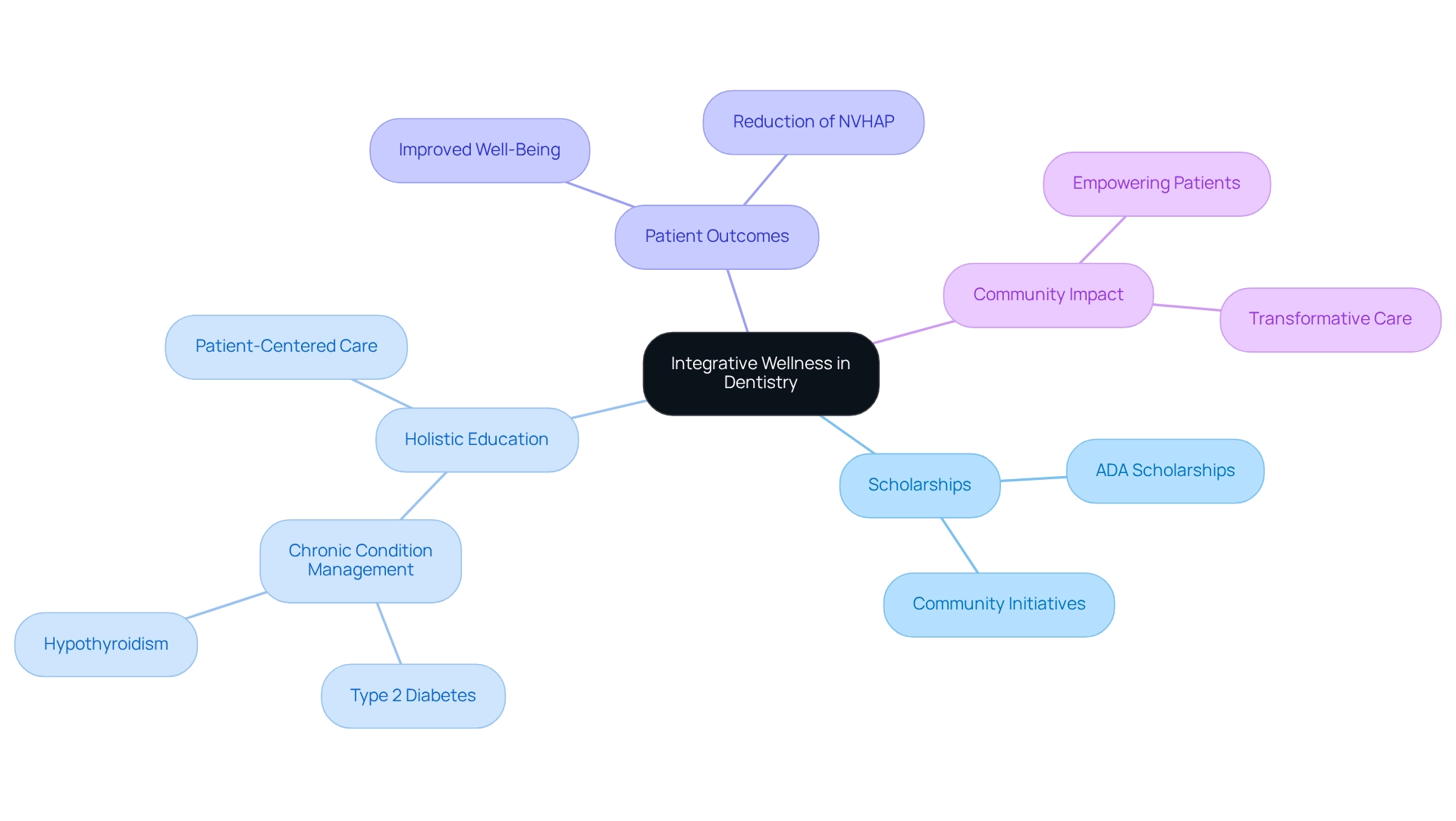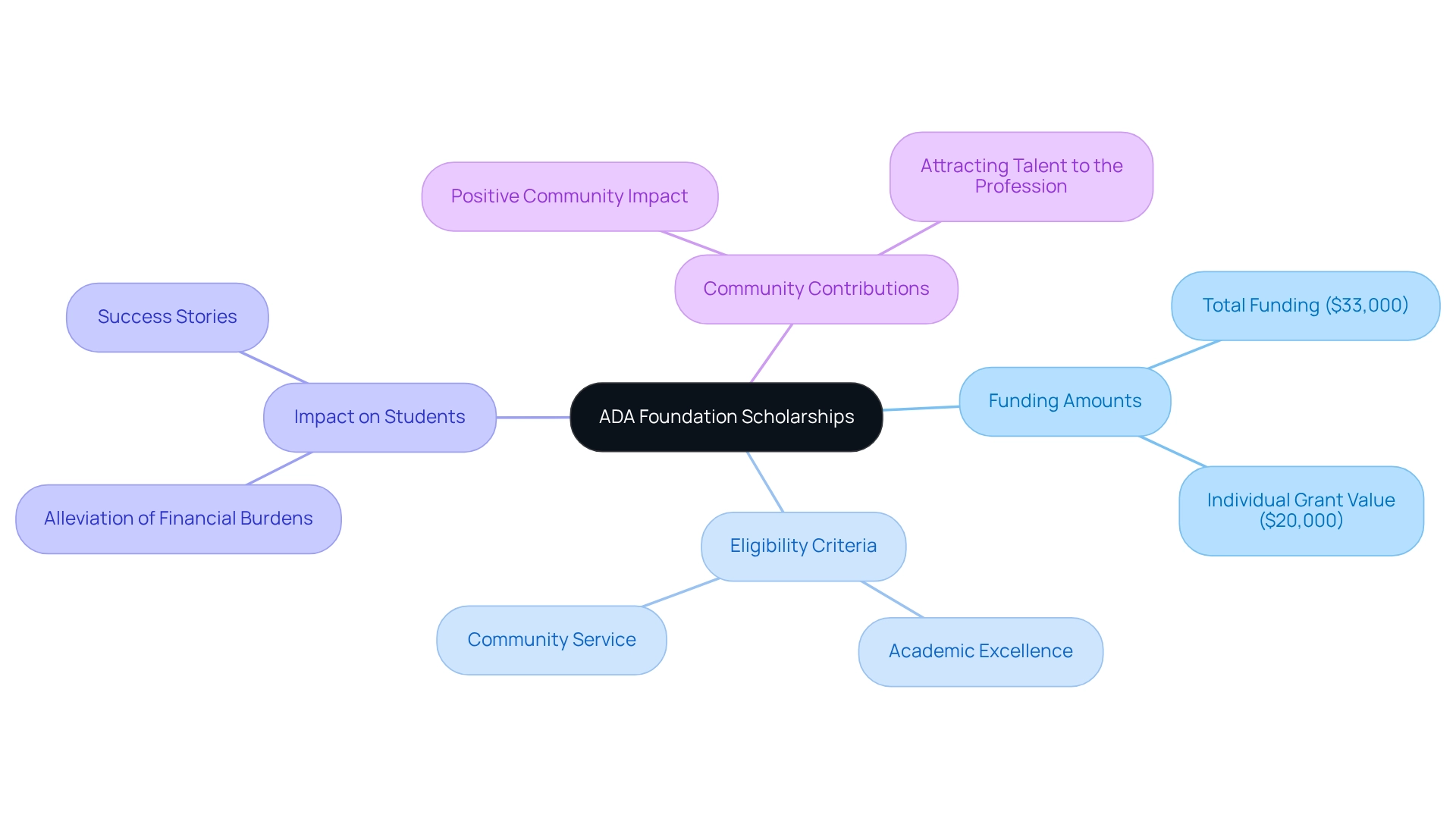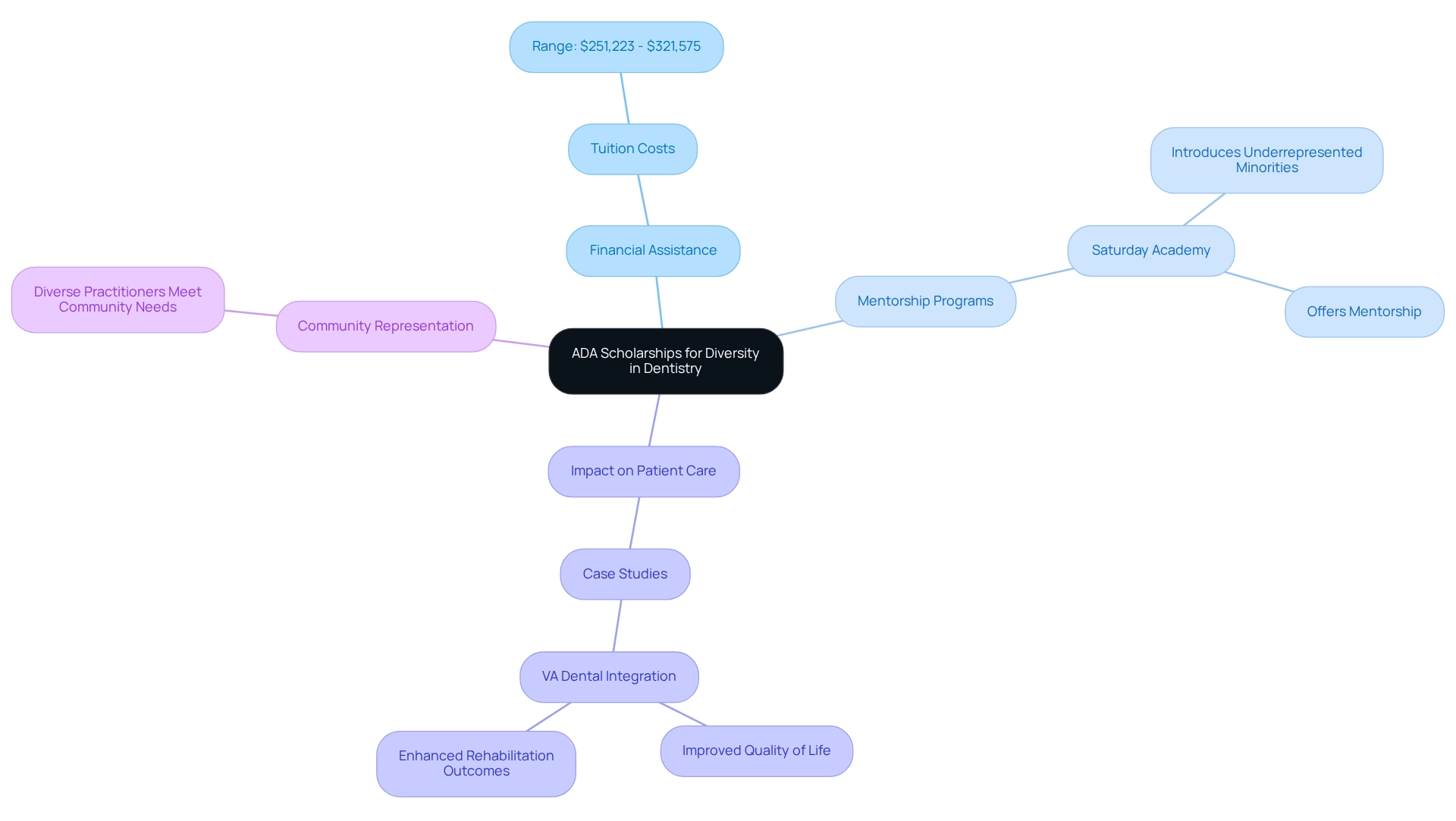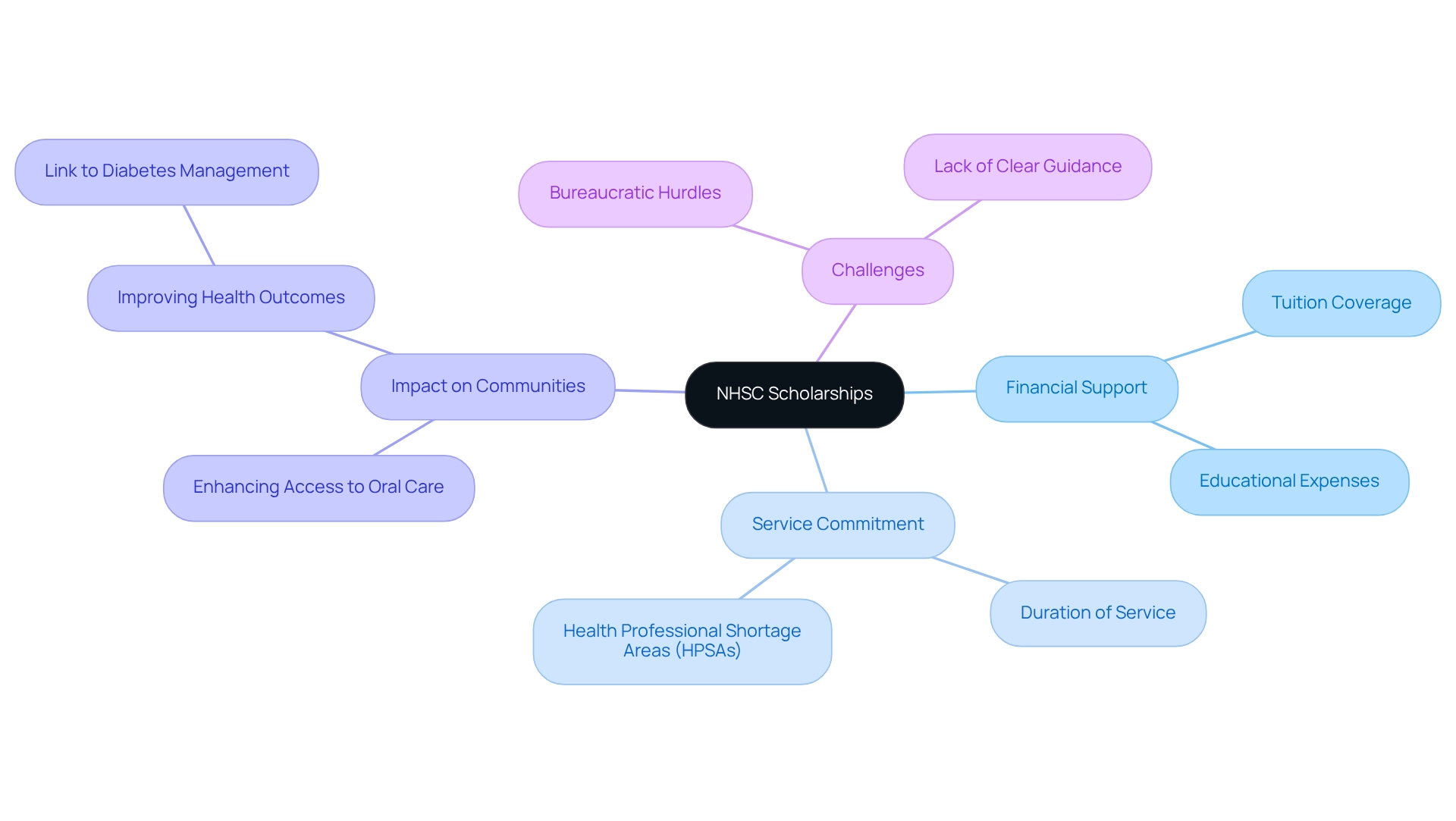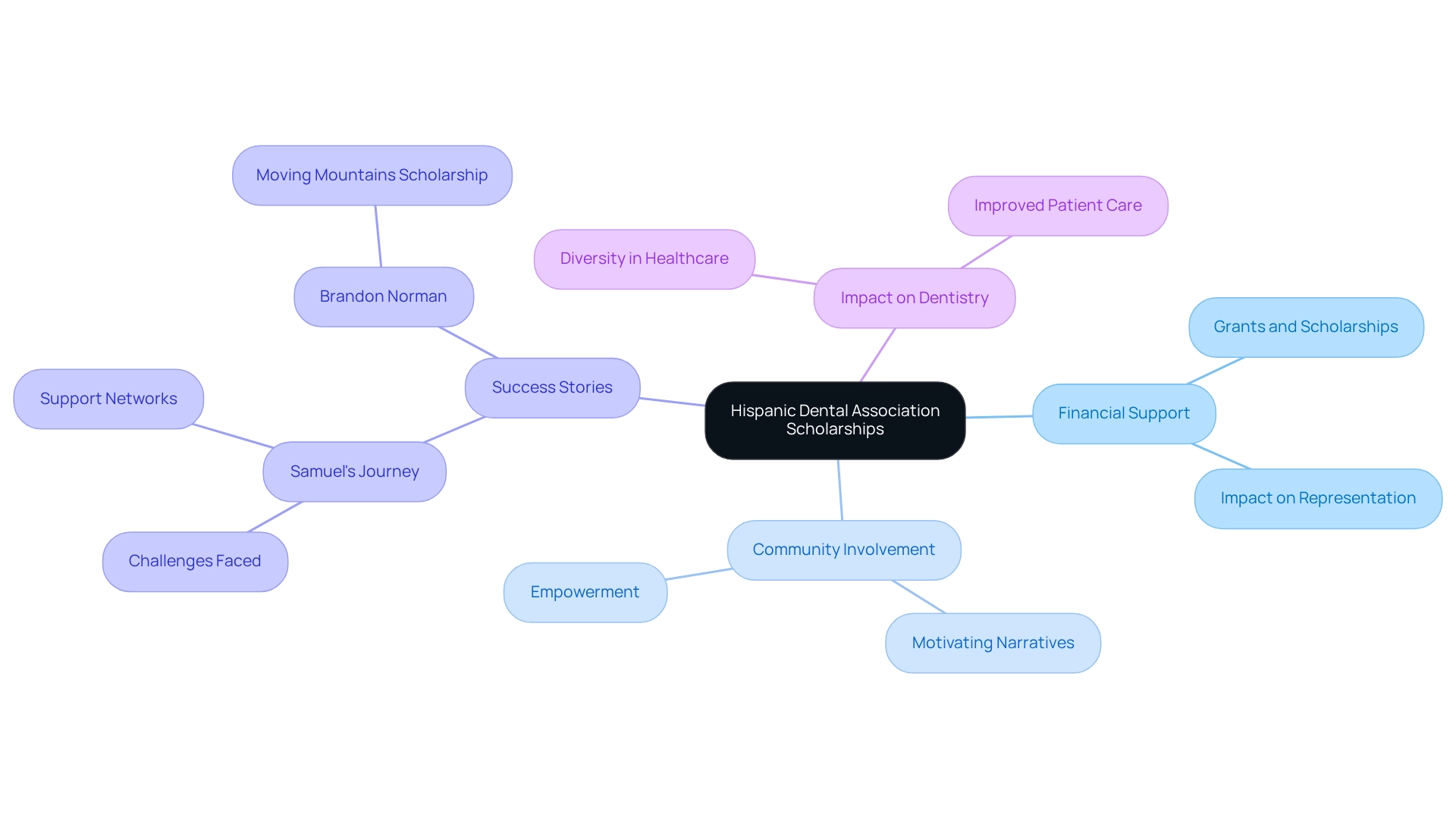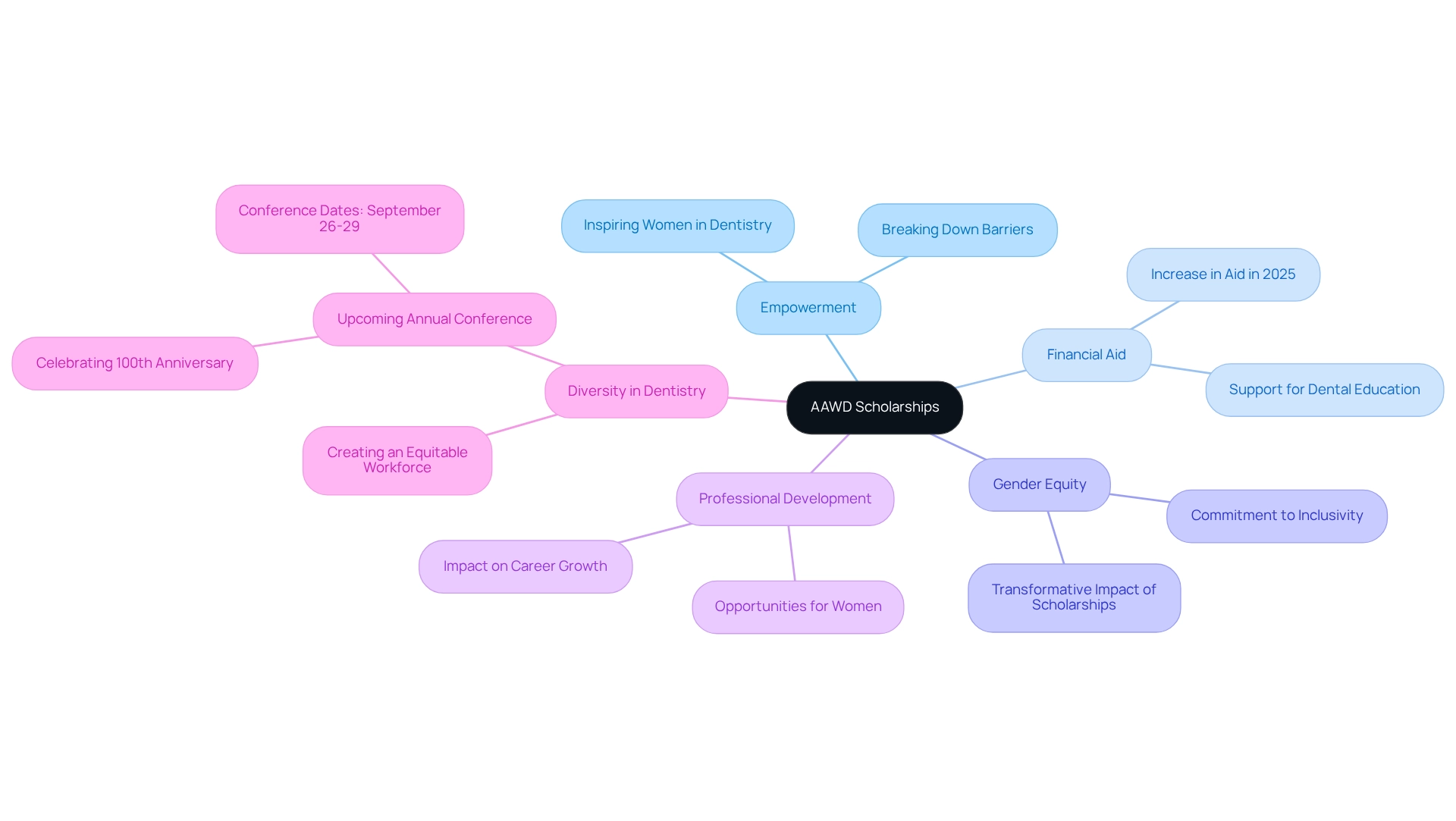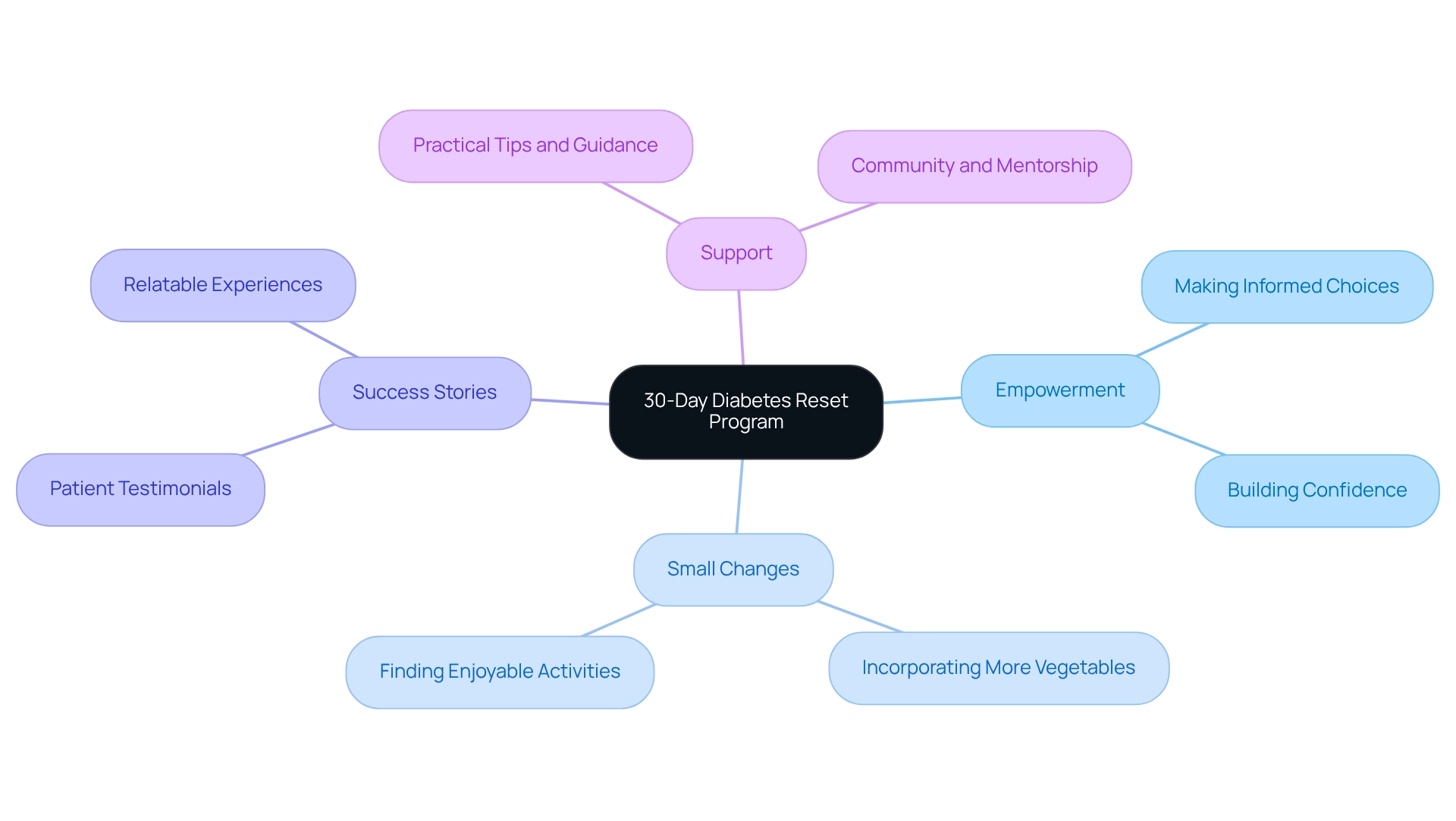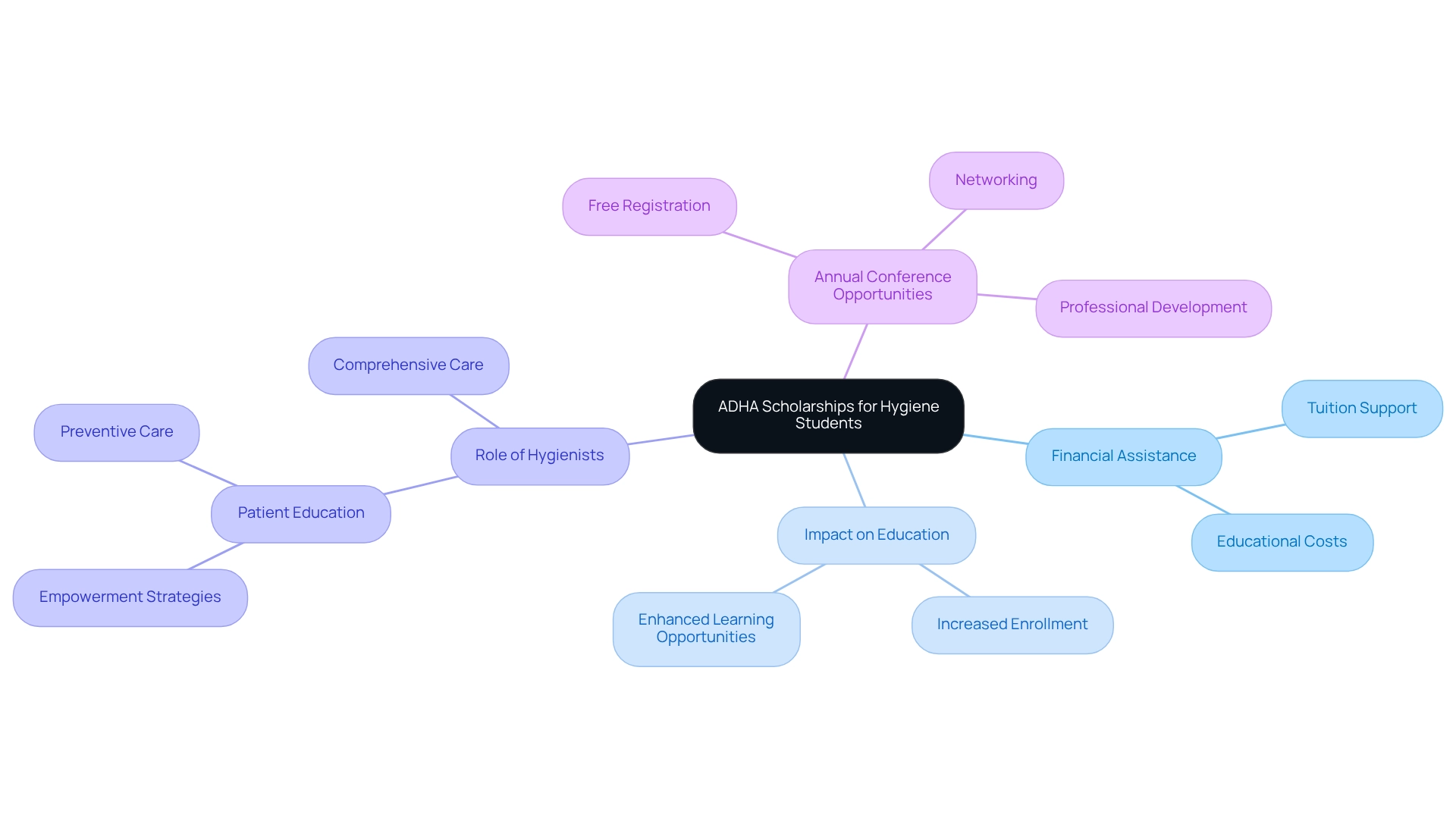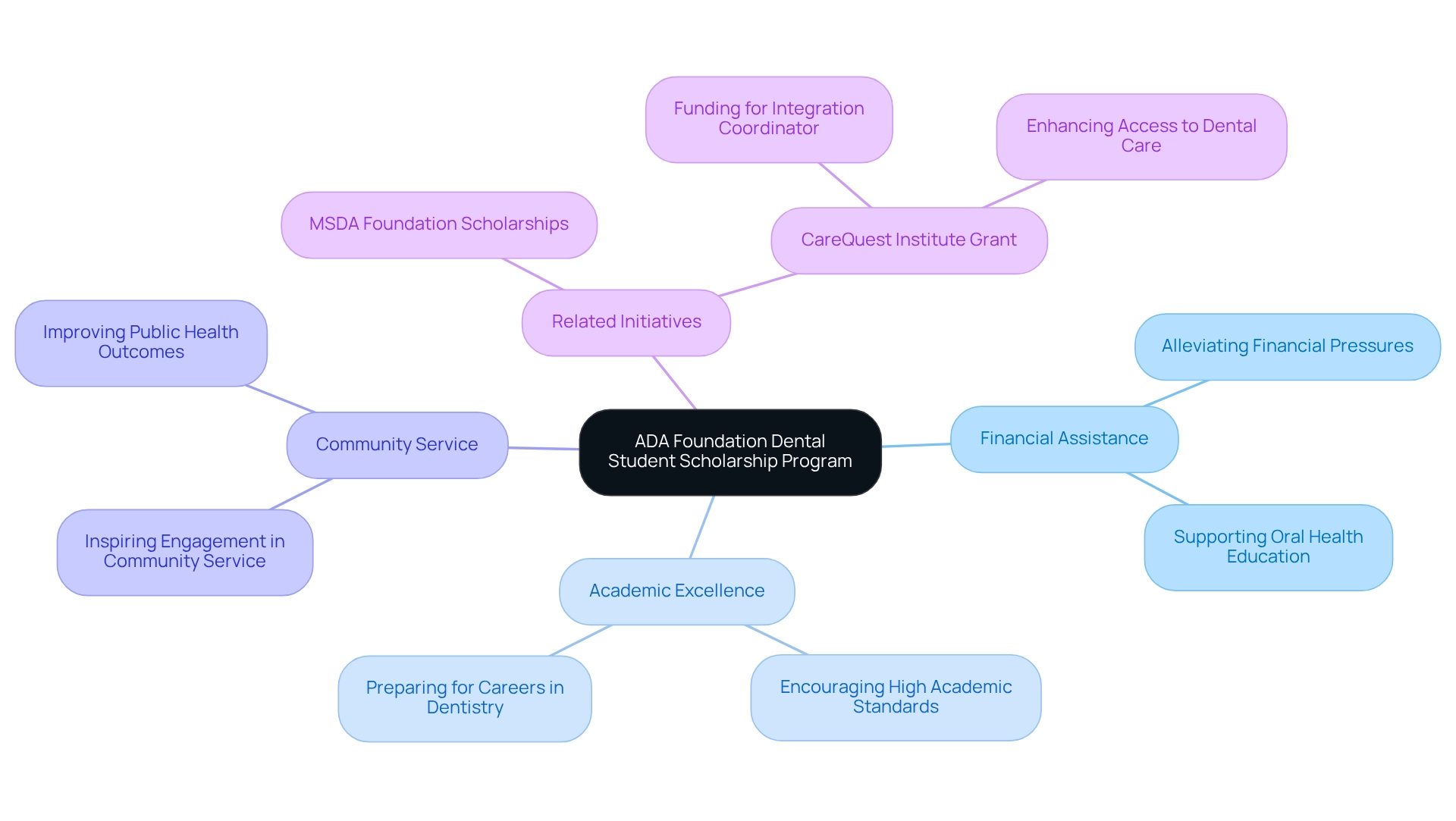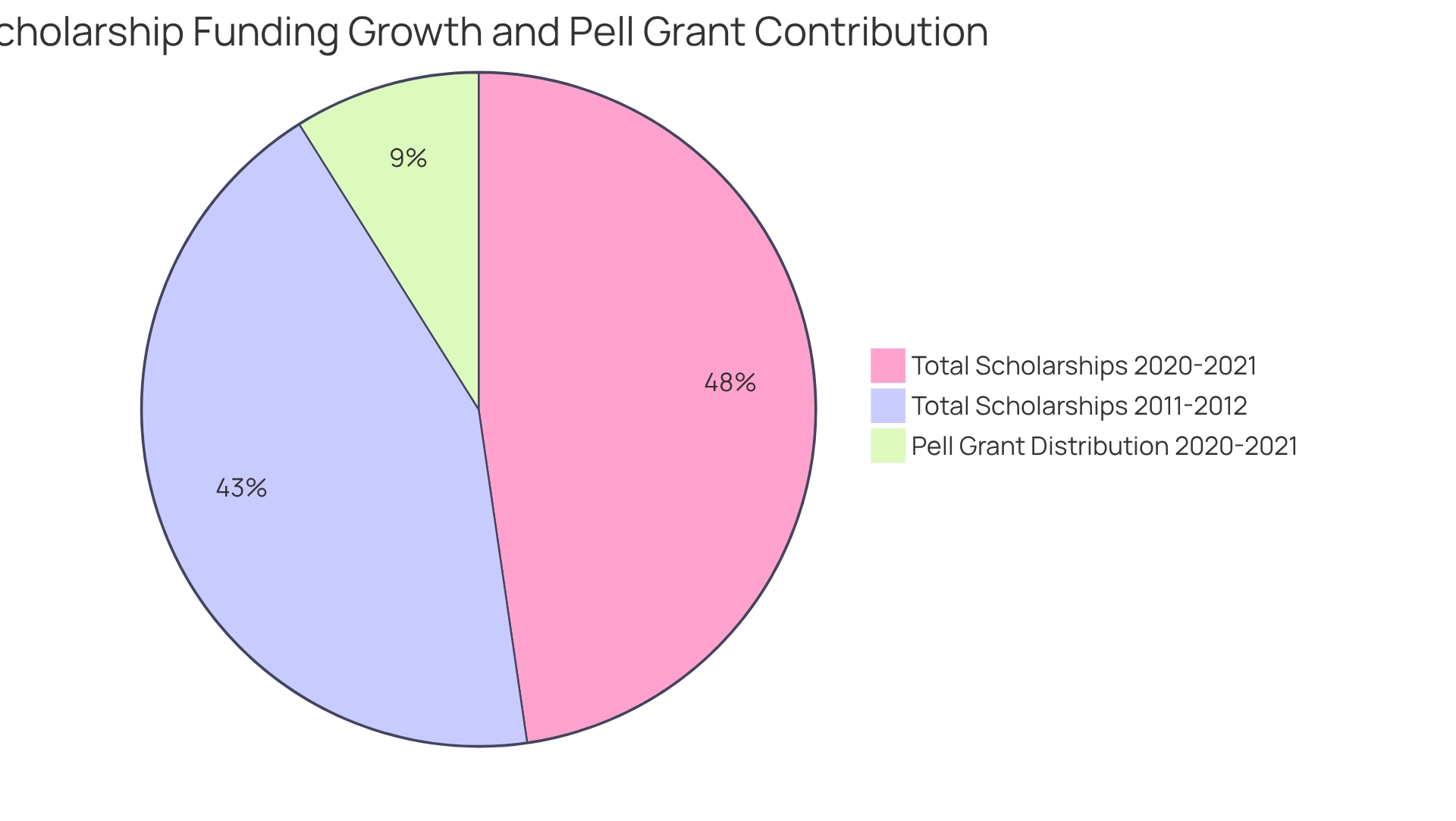Overview
The article highlights various scholarships available for aspiring dental students in 2025, focusing on seven key programs that offer financial support and promote diversity within the dental profession. It’s important to recognize that these scholarships not only alleviate financial burdens but also foster a holistic and community-oriented approach to dental care. By doing so, they enhance representation and improve the quality of care in the field. Many students find that such opportunities not only support their education but also connect them to a broader community of future dental professionals.
Introduction
In the evolving landscape of dental education, many organizations are stepping up to support aspiring dentists. These scholarships not only ease financial burdens but also promote a holistic approach to patient care.
It’s important to recognize that:
- Integrative wellness centers emphasize chronic health management.
- Initiatives aimed at enhancing diversity within the profession.
These scholarships play a pivotal role in shaping the future of dentistry. As the demand for dental professionals grows, particularly in underserved communities, understanding the various financial support options available becomes essential for students dedicated to making a meaningful impact in their field.
This article explores the diverse scholarship opportunities that empower the next generation of dentists, highlighting their significance in fostering a more inclusive and health-conscious dental workforce.
Integrative Wellness Center: Scholarships for Aspiring Dentists
Integrative wellness centers are increasingly focusing on nurturing future oral care professionals who embrace holistic wellness principles, particularly in managing persistent conditions like type 2 diabetes. Grants from these centers often target individuals dedicated to weaving wellness into their oral care practices, especially those involved in community wellness initiatives or planning to serve in underserved areas through ADA scholarships. These ADA scholarships not only ease financial burdens but also inspire a new generation of dentists to adopt a more comprehensive approach to patient care, particularly in understanding the risks tied to conventional diabetes treatments.
It’s important to recognize that comprehensive wellness education in oral care programs significantly enhances students’ understanding of patient-focused treatment, ultimately leading to improved well-being outcomes. For example, nonventilator hospital-acquired pneumonia affects about 1 in every 100 hospitalized patients, highlighting the crucial role of oral care as a therapeutic intervention. Karen Giuliano, a professor at the University of Massachusetts-Amherst, emphasizes this vital shift in mindset, stating, “We really have to switch the mindset of hospital staff from oral care as a comfort hygiene method to oral care as a therapeutic intervention. If we can do that, we can go a long way.”
Many patients find that by promoting this mindset, integrative wellness centers are shaping a future where oral care professionals are well-equipped to meet the broader wellness needs of their communities, especially concerning chronic conditions like diabetes and hypothyroidism. This holistic approach not only empowers patients but also enhances overall well-being, aligning with the transformative care that Dr. Jason Shumard advocates for in reversing type 2 diabetes. For instance, patients like Ed, who faced diabetes challenges for years, have seen remarkable health improvements after adopting a holistic approach, losing weight and reducing their reliance on medications. Such testimonials truly highlight the effectiveness of this model in transforming patient outcomes.
ADA Foundation Scholarships: Financial Support for Dental Students
The ADA Foundation plays a vital role in supporting aspiring dental professionals across the United States. Through various grants, it addresses the financial challenges that often accompany education in dentistry. These grants are thoughtfully designed for individuals enrolled in recognized oral health programs, providing essential financial assistance for tuition and other academic expenses. Notably, the ADA Foundation Dental Student Funding Program awards a total of $33,000 each year, with each grant valued at $20,000. This recognition is for students who not only excel academically but also show a strong commitment to community service.
By significantly alleviating financial burdens, these grants empower aspiring dentists to concentrate on their studies and future careers without the overwhelming stress of financial constraints. It’s important to recognize that educators in the oral health sector strongly support these initiatives, highlighting that financial assistance is crucial for attracting and retaining talented individuals in the profession. Many recipients of these grants share success stories that illustrate the transformative impact of this support. These stories showcase how the grants enable them to pursue their dreams of becoming dentists while positively contributing to their communities.
The ADA Foundation’s commitment to nurturing the next generation of oral health practitioners is evident in the growing number of individuals benefiting from these financial awards. This creates a lasting impact on the field of oral education, fostering a brighter future for both students and the communities they serve.
American Dental Association Scholarships: Promoting Diversity in Dentistry
The American Dental Association (ADA) deeply cares about fostering diversity in the oral health field by offering ADA scholarships to underrepresented minority individuals pursuing education in this vital area. These ADA scholarships play a crucial role in addressing disparities in oral care, as they help increase the representation of diverse practitioners who can better meet the unique needs of various communities. In 2025, the ADA continues to prioritize financial assistance for these individuals, recognizing that a diverse workforce enriches the oral health field and enhances patient care.
It’s important to recognize that the average total tuition and fees for a four-year oral health program can range from $251,223 to $321,575. This reality makes financial support indispensable for many aspiring oral health professionals. The ADA’s commitment to diversity is further exemplified by initiatives like the ‘Saturday Academy’ at NYU School of Dentistry, which introduces underrepresented minority and low-income high school students to the profession of dentistry, providing mentorship and guidance along the way.
Many patients find that case studies, such as the integration of oral care within the Veterans Affairs (VA) system, showcase the positive outcomes of comprehensive care models that include diverse practitioners. This integration has significantly improved the quality of life and rehabilitation results for veterans, underscoring the importance of diversity in healthcare, while highlighting that the impact of ADA scholarships extends beyond individual students and is vital in cultivating a more inclusive oral health workforce. By advocating for diversity through ADA scholarships, the ADA not only empowers marginalized individuals but also strengthens the profession as a whole, ensuring it reflects the communities it serves. Expert insights affirm that enhancing diversity in education is essential for fostering a healthcare environment that is sensitive to the needs of all patients.
National Health Service Corps Scholarships: Serving Underserved Communities
The National Health Service Corps (NHSC) provides vital financial support to future dentists who commit to serving in Health Professional Shortage Areas (HPSAs) after graduation. These scholarships not only cover tuition and educational expenses but also come with a service commitment, typically lasting two years. By encouraging aspiring dentists to practice in underserved areas, the NHSC plays a crucial role in improving access to oral care and addressing significant wellness gaps.
It’s heartening to see that in 2025, the NHSC continues to prioritize support for students in dentistry from historically marginalized backgrounds. This initiative ensures they have the necessary resources to succeed in their education and future careers. Such efforts are essential in fostering a more equitable healthcare environment, as they directly contribute to enhancing community wellness and outcomes.
Oral health specialists note that working in these neglected regions not only fulfills a community need but also enriches the experiences of practitioners. They have the opportunity to make a meaningful impact on the lives of those they serve. Additionally, the CareQuest Institute’s recent $125,000 grant to Vista Community Clinic highlights the financial support available for community wellness initiatives, which can improve access to care for individuals living with chronic conditions, including type 2 diabetes.
Trenae Simpson, MBA, grants and programs director at CareQuest Institute, emphasizes, “It’s our intention to invest in communities that have been historically marginalized that haven’t had a seat at the table.” However, it’s important to recognize that navigating the NHSC program can be challenging. This was highlighted in the case study “Navigating NHSC’s Complexities,” where participants shared the bureaucratic hurdles they encountered. Understanding these intricacies is crucial for potential grant recipients, especially since enhanced access to oral care can significantly influence overall health outcomes for individuals with diabetes, given the strong link between oral health and diabetes management.
Hispanic Dental Association Scholarships: Supporting Hispanic Dental Students
The Hispanic Dental Association (HDA) plays an essential role in assisting Hispanic individuals seeking education in dentistry through its committed funding programs. These grants not only offer crucial financial support but also promote diversity within the dentistry field. It’s important to recognize that by motivating learners to share their narratives and ambitions, the HDA cultivates a feeling of community involvement and empowerment among candidates.
In 2025, the HDA continues to make strides in raising the number of Hispanic individuals in dentistry receiving financial aid, demonstrating a dedication to enhancing representation in the profession. Many patients find that success stories, like that of Samuel—a first-generation college attendee—highlight the difficulties faced by numerous Hispanic individuals, including financial obstacles and insufficient support in navigating the application process for oral health programs. Samuel’s journey underscores the significance of support networks and representation in dentistry, which the HDA actively advocates.
Statistics show that the HDA’s financial aid programs greatly influence Hispanic representation in dentistry. This leads to a more varied workforce that ultimately improves patient care and health outcomes in Hispanic communities. Notably, Brandon Norman’s achievement in winning the ‘Moving Mountains’ Scholarship for Hispanic Students exemplifies the success that these programs can foster. As Erik Montlack, President of Delta Dental of Massachusetts, emphasizes, nurturing a varied and inclusive workforce is crucial for enhancing overall fairness in oral healthcare.
The HDA’s dedication to supporting Hispanic learners in the field is essential for developing a more inclusive healthcare atmosphere. By ensuring that future professionals mirror the communities they serve, the HDA not only empowers individual learners but also enhances the profession of dentistry as a whole.
American Association of Women Dentists Scholarships: Empowering Women in Dentistry
The American Association of Women Dentists (AAWD) provides focused financial aid for women pursuing education in dentistry, playing a vital role in empowering female students in a field that has traditionally been male-dominated. These grants not only offer crucial financial assistance but also serve as a catalyst for breaking down barriers, inspiring more women to enter and excel in dentistry.
In 2025, the AAWD continues to champion gender equity and diversity, with a noticeable increase in the number of women receiving financial aid for their studies. This trend signifies a growing commitment to fostering an inclusive environment in the profession. Expert opinions highlight the transformative impact of ada scholarships, emphasizing their importance in enhancing professional development and creating opportunities for women in dentistry.
By investing in female trainees in oral health, the AAWD is not just supporting individual aspirations but also contributing to the creation of a more equitable and diverse workforce in dentistry. As the AAWD approaches its 100th anniversary, it reflects on its journey and the importance of remaining relevant in the oral health sector. The upcoming annual conference, scheduled for September 26-29, aims to celebrate this significant milestone.
Aisha Amel M. Daigle, president of the GSDM chapter of the AAWD, expressed, ‘Winning Chapter of the Year is a historic accomplishment for our group,’ underscoring the positive influence of AAWD initiatives on women pursuing dentistry. The increase in financial aid awarded in 2025 further emphasizes the AAWD’s dedication to uplifting women in the field.
National Dental Association Scholarships: Enhancing Representation in Dentistry
This section of the article addresses the challenges faced by those managing diabetes. It’s important to recognize that navigating this condition can feel overwhelming at times. Many patients find themselves struggling with dietary changes and lifestyle adjustments, which can lead to feelings of frustration and uncertainty. We understand these emotions and want you to know that you are not alone in this journey.
As you embark on the path to healthier living, consider the 30-Day Diabetes Reset program. This initiative is designed to support you every step of the way, offering practical tips and guidance tailored to your needs. Imagine feeling empowered to make choices that benefit your health—this desire for improvement is the first step toward lasting change.
Incorporating small, manageable changes into your daily routine can lead to significant benefits over time. For instance, many patients have shared their success stories about simple adjustments, like incorporating more vegetables into meals or finding enjoyable ways to stay active. These relatable experiences can inspire you to take action, knowing that others have walked this path before you.
Remember, the journey toward better health is not a sprint but a gradual process. As you reflect on your own experiences, ask yourself: What small change can I make today that will bring me closer to my goals? Each step forward is a victory worth celebrating. Embrace the support available through the program, and let’s work together to create a healthier future for you.
American Dental Hygienists’ Association Scholarships: Funding for Hygiene Students
The American Dental Hygienists’ Association (ADHA) offers crucial grants for individuals pursuing careers in hygiene, providing important financial assistance to ease tuition and educational costs. It’s heartening to know that in 2025, many oral health learners will benefit from these financial aid programs. Not only do they improve educational prospects, but they also support a well-rounded healthcare workforce capable of delivering comprehensive care. This assistance is essential, as oral hygienists play a vital role in patient education and preventive care, significantly impacting overall wellness results.
Based on recent data, the ADHA’s commitment to financing oral hygiene education has led to a notable increase in individuals receiving financial aid, nurturing a new generation of professionals dedicated to enhancing patient well-being. Additionally, students have the wonderful opportunity to attend the Annual Conference with free registration, which offers further educational benefits and valuable networking opportunities.
Expert opinions highlight the crucial role hygienists play in educating patients about oral health, underscoring the importance of these grants in shaping future practitioners. As Angie, a certified hygienist, wisely states, “Learn all that you can, be open to all options!” This sentiment beautifully encapsulates the ethos of the ADA scholarships program, which encourages learners to explore diverse educational pathways and enrich their contributions to the field. Dr. Jason Shumard’s focus on patient education and empowerment aligns perfectly with this mission, demonstrating how well-informed hygienists can profoundly influence patient health outcomes.
ADA Foundation Dental Student Scholarship Program: Nationwide Support
The ADA scholarships program offers essential financial assistance to individuals enrolled in accredited programs across the United States. This initiative is thoughtfully designed to support learners who not only show academic excellence but also demonstrate a deep commitment to community service. By alleviating the financial pressures associated with oral health education, the ADA scholarships provided by the ADA Foundation allow learners to concentrate on their studies and prepare for rewarding careers in dentistry.
In 2025, this program continues to play a vital role in nurturing a skilled and diverse workforce in the oral health field, benefiting many learners who rely on its support. For instance, the MSDA Foundation also provides scholarships and grants for individuals, further enhancing the financial resources available to aspiring oral health professionals.
It’s important to recognize that the ADA Foundation’s dedication to nationwide assistance through ADA scholarships is crucial for developing future dental professionals equipped to meet the evolving needs of their communities. This support not only enhances educational opportunities but also inspires learners to engage in community service, ultimately leading to improved public health outcomes. As Dr. Jason Shumard reflects, “By providing patients with actionable insights and practical tools, the center fosters an environment where individuals can reclaim their health and well-being,” highlighting the empowerment that financial support can bring to learners on their educational journeys. Furthermore, initiatives like the $125,000 CareQuest Institute grant obtained by Vista Community Clinic underscore the importance of funding in advancing oral health education and community service.
American Academy of Pediatric Dentistry Scholarships: Focusing on Pediatric Care
The American Academy of Pediatric Dentistry (AAPD) provides crucial financial aid for those dedicated to careers in pediatric dentistry. This support not only alleviates financial burdens but also inspires individuals who are deeply committed to offering specialized dental care for children. It’s important to recognize that the landscape of financial aid is evolving; recent statistics reveal that the total value of scholarships in the U.S. rose from $126 billion in 2011-2012 to $138.6 billion in 2020-2021. This growth underscores the increasing significance of financial assistance in education.
As Imed Bouchrika, Co-Founder and Chief Data Scientist, pointed out, “The Pell Grant distributed the most funds among all federal grant programs with $25.97 billion awarded in 2020-2021.” This highlights the vital role of financial support for students pursuing their dreams. By investing in the education of future pediatric dentists, the AAPD is ensuring that children receive the specialized care they need for their unique oral health requirements.
This focus on pediatric care is essential for nurturing healthy oral habits from an early age and effectively addressing the specific challenges related to children’s oral health. However, many aspiring professionals encounter obstacles in securing ADA scholarships, making it crucial to understand the funding landscape. In 2025, the AAPD remains committed to assisting those who aspire to join this noble profession, recognizing that financial aid significantly impacts individuals’ ability to pursue their passion for pediatric dentistry.
As the number of students seeking these scholarships continues to rise, the AAPD is dedicated to fostering a new generation of dentists who are well-equipped to provide exceptional care for young patients.
Conclusion
The landscape of dental education is being transformed through the numerous scholarship opportunities available to aspiring dentists. It’s important to recognize that organizations like integrative wellness centers, the ADA Foundation, and the National Health Service Corps are playing pivotal roles in shaping a future that emphasizes holistic health, community service, and diversity within the profession. By alleviating financial burdens, these scholarships empower students to pursue their passion for dentistry while addressing critical health issues in underserved communities.
Many students find that targeted initiatives aimed at enhancing representation—such as those from the Hispanic Dental Association and the American Association of Women Dentists—are vital in creating a more inclusive workforce. This diversity not only enriches the dental profession but also ensures that various communities receive the tailored care they need. The commitment to supporting underrepresented groups in dentistry is essential for fostering a healthcare environment that is responsive to all patients.
In conclusion, the scholarship programs discussed are more than just financial assistance; they represent a commitment to cultivating a skilled, compassionate, and diverse dental workforce. As the demand for dental professionals continues to rise, understanding and utilizing these opportunities will be crucial for the next generation of dentists dedicated to making a meaningful impact in their communities. Investing in dental education today will lead to healthier, more equitable futures for everyone.
Frequently Asked Questions
What is the focus of integrative wellness centers in relation to oral care professionals?
Integrative wellness centers are focusing on nurturing future oral care professionals who embrace holistic wellness principles, particularly in managing persistent conditions like type 2 diabetes.
How do grants from integrative wellness centers support oral care practices?
Grants from these centers target individuals dedicated to incorporating wellness into their oral care practices, especially those involved in community wellness initiatives or planning to serve in underserved areas through ADA scholarships.
What is the significance of ADA scholarships for dental students?
ADA scholarships ease financial burdens for dental students and inspire a new generation of dentists to adopt a comprehensive approach to patient care, particularly in understanding the risks associated with conventional diabetes treatments.
How does comprehensive wellness education impact dental students?
Comprehensive wellness education enhances students’ understanding of patient-focused treatment, leading to improved well-being outcomes for patients.
What example illustrates the importance of oral care as a therapeutic intervention?
Nonventilator hospital-acquired pneumonia affects about 1 in every 100 hospitalized patients, highlighting the crucial role of oral care as a therapeutic intervention.
What mindset shift is emphasized by Karen Giuliano regarding oral care?
Karen Giuliano emphasizes the need to shift the mindset of hospital staff from viewing oral care as merely a comfort hygiene method to recognizing it as a therapeutic intervention.
How are integrative wellness centers shaping the future of oral care professionals?
Integrative wellness centers promote a holistic approach that equips oral care professionals to meet the broader wellness needs of their communities, particularly concerning chronic conditions like diabetes and hypothyroidism.
What role does the ADA Foundation play in supporting dental students?
The ADA Foundation supports aspiring dental professionals by providing grants that address financial challenges in dental education, awarding a total of $33,000 each year to eligible students.
How do grants from the ADA Foundation benefit dental students?
These grants alleviate financial burdens, allowing students to focus on their studies and careers without the stress of financial constraints, and they often encourage community service.
What initiatives does the ADA Foundation undertake to promote diversity in oral health education?
The ADA Foundation offers scholarships to underrepresented minority individuals and supports initiatives like the ‘Saturday Academy’ at NYU School of Dentistry to introduce students to the profession and provide mentorship.
Why is diversity in the oral health workforce important?
A diverse workforce enriches the oral health field and enhances patient care by better meeting the unique needs of various communities.
What are the average tuition costs for a four-year oral health program?
The average total tuition and fees for a four-year oral health program can range from $251,223 to $321,575, making financial support essential for many aspiring professionals.
How have case studies demonstrated the importance of diversity in healthcare?
Case studies, such as the integration of oral care within the Veterans Affairs system, show that diverse practitioners can significantly improve quality of life and rehabilitation outcomes for patients.
